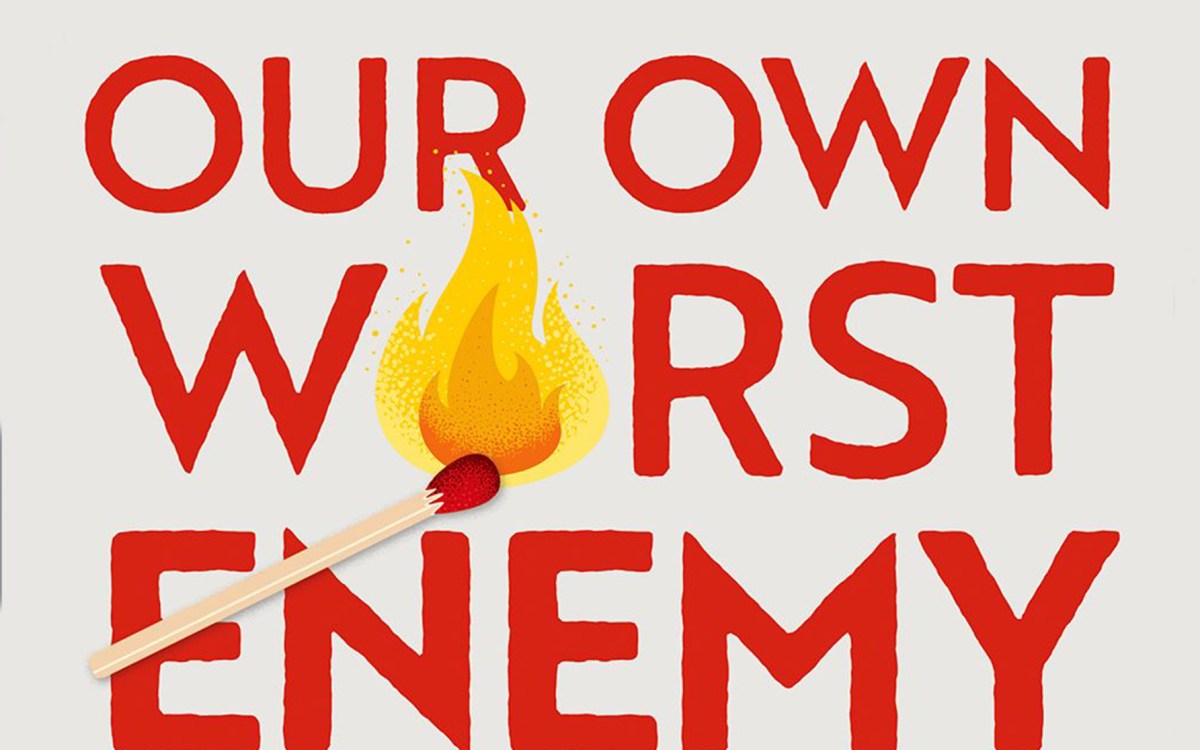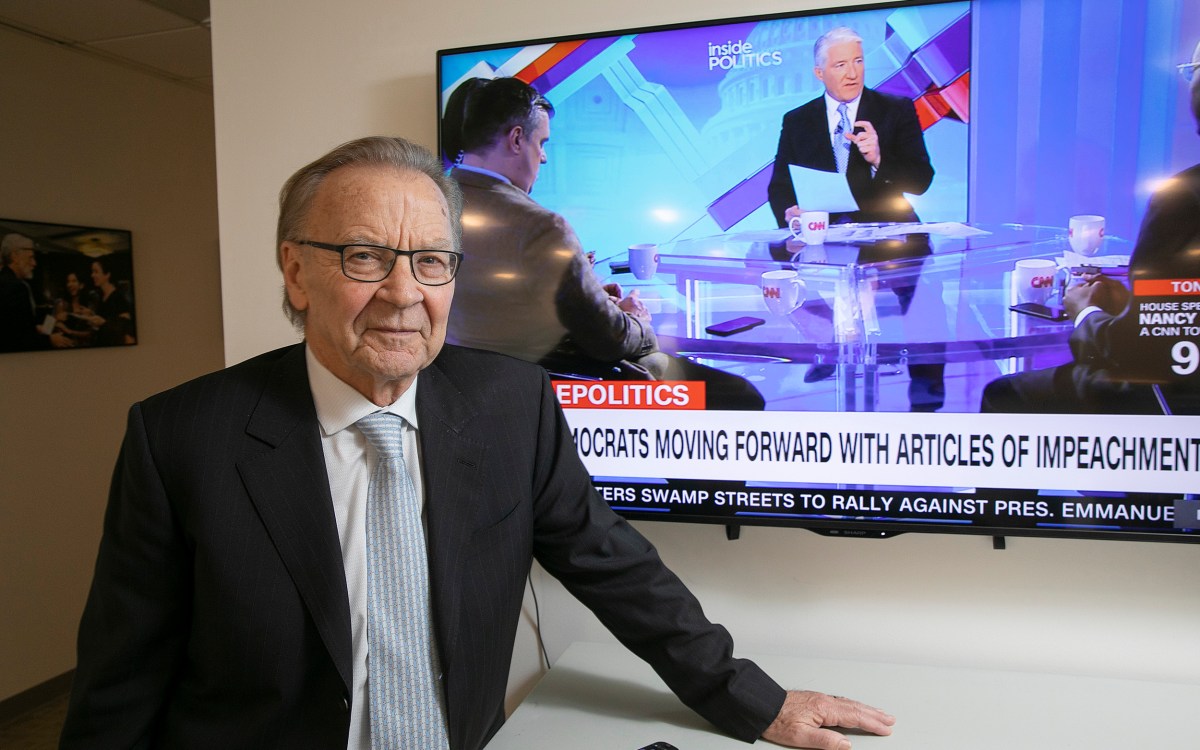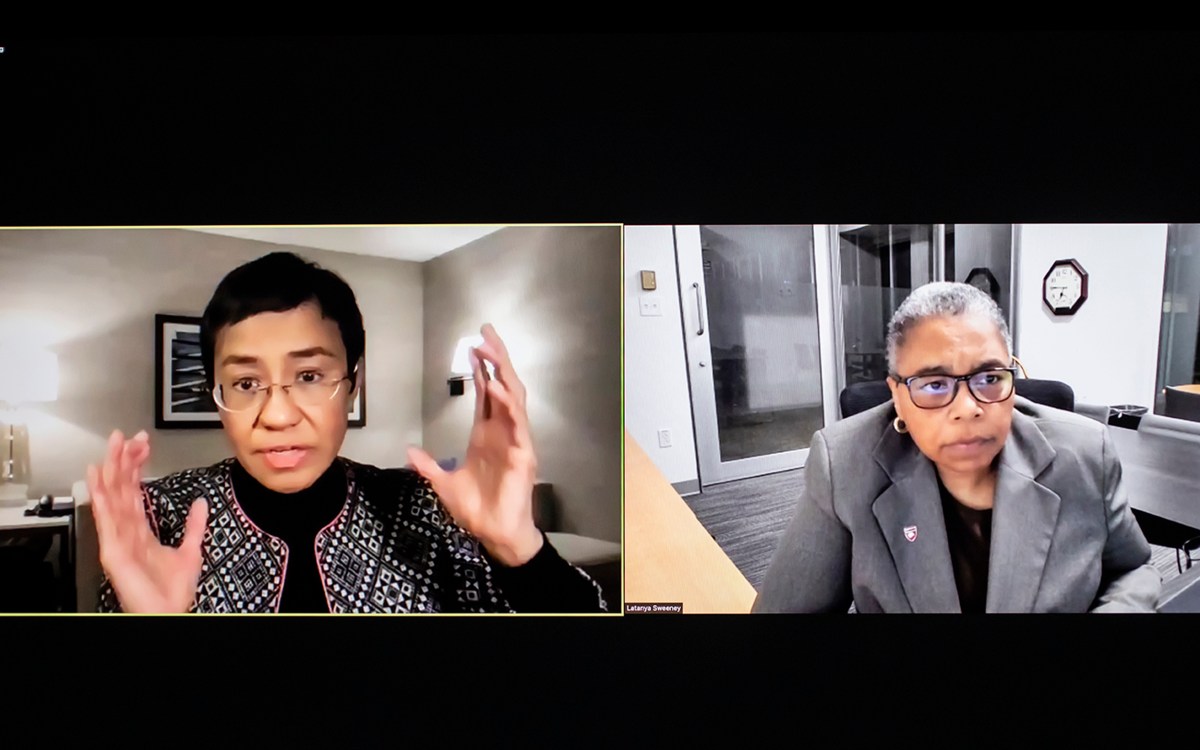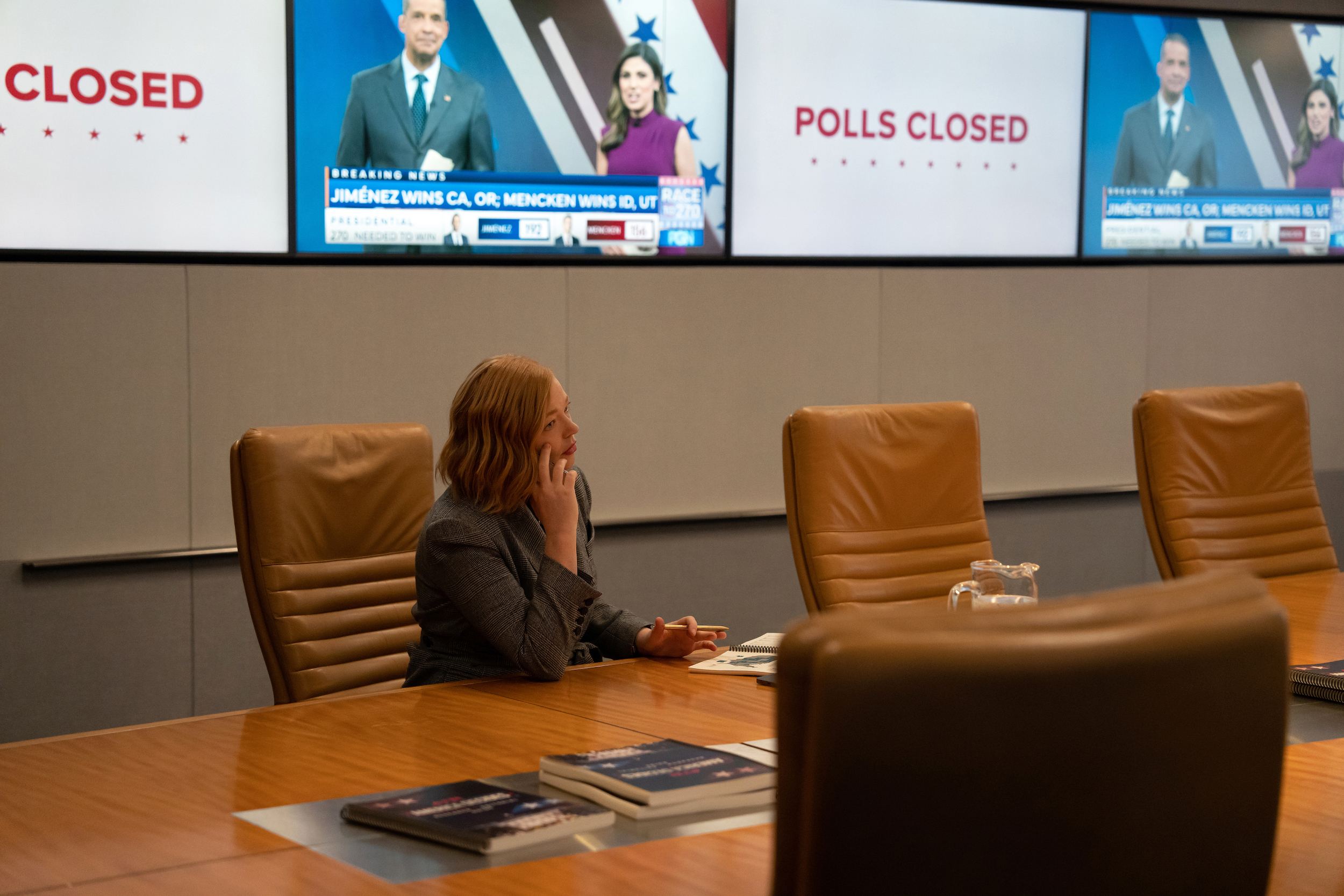
Sarah Snook as Shiv Roy in “Succession.”
HBO Max
Fanning the flames on ‘Succession’
Scholar who played pundit on dark election episode — ‘that was me behind Tom and Greg’ — describes surreal experience of ‘art imitating life’
On Sunday, HBO’s dark satire “Succession” aired an uncanny episode set inside a cable news network covering a close presidential election between a far-right Republican and a moderate Democrat. In it, international affairs expert Thomas M. Nichols played the role of a right-wing analyst who spins a conspiratorial narrative after a fire destroys 100,000 absentee ballots in a swing state.
A professor emeritus of national security affairs at the U.S. Naval War College, Nichols has taught at the Harvard Extension School and is a writer at The Atlantic. When he received the call to play a pundit on a fictional news channel inspired by Rupert Murdoch’s conservative media empire, he didn’t think twice. The Gazette asked Nichols about the lessons he learned from both watching the show and being on it. The interview has been edited for clarity and length.
Spoiler alert: If you haven’t yet watched Episode 8 in the current season of “Succession,” stop reading now.
Q&A
Thomas M. Nichols
GAZETTE: Have you always been a fan of “Succession”? Do you identify with any of the characters or have a favorite moment from the series?
NICHOLS: I did watch it from the beginning, but I sometimes get lost in the plot. Mostly I watch it because of the exceptional writing. I probably wouldn’t have watched a show that’s just about a family fighting over money. But “Succession” has this dark humor that really appeals to me. My wife is a huge fan of the show, and she is able to follow all of the intricate plots and machinations. I’m constantly laughing out loud at the great lines.
It’s difficult to love any of the characters. I suppose that, as an older guy, I identify with [patriarch] Logan. The best moment for me in the show was the line that summed up everything Logan felt when he said [to his children], “I love you all, but you are not serious people.”
GAZETTE: How did you get the gig? How did it feel playing the role of a right-wing political pundit?
NICHOLS: I’ve been on network television shows many times over the past 30 years, and it was a very weird feeling to be part of art imitating life. I was fascinated by playing a fictionalized version of a world that I have been a part of for many years.
How did I get the gig? A producer of the show called a friend of mine and said, “Look, they need a middle-aged, curmudgeon, white guy to be a right-winger.” My friend told them, “I’ve got your man.” I just laughed. I was flattered. A certain amount of self-awareness is good. I had to admit that I fit the description. But the producer didn’t know anything about me. He had no idea who I was.
GAZETTE: Did you have to audition?
NICHOLS: No. The producer went and looked at tapes of me that were already on the internet of news appearances I had done. He called me on the phone for an interview. And then I had to get on a train that night to be in New York the next day.
GAZETTE: Were you nervous about it?
NICHOLS: I was terrified. I was one of the few people who was not a professional broadcast person. The cast included professional actors and professional broadcast journalists, but I come from a world of teaching and print. People around me were very comfortable looking in a camera and reading teleprompters. I’m not uncomfortable on camera, but these people had a natural talent and years of experience that I found very intimidating. All my colleagues on the set were very nice to me, by the way, but I was nervous.
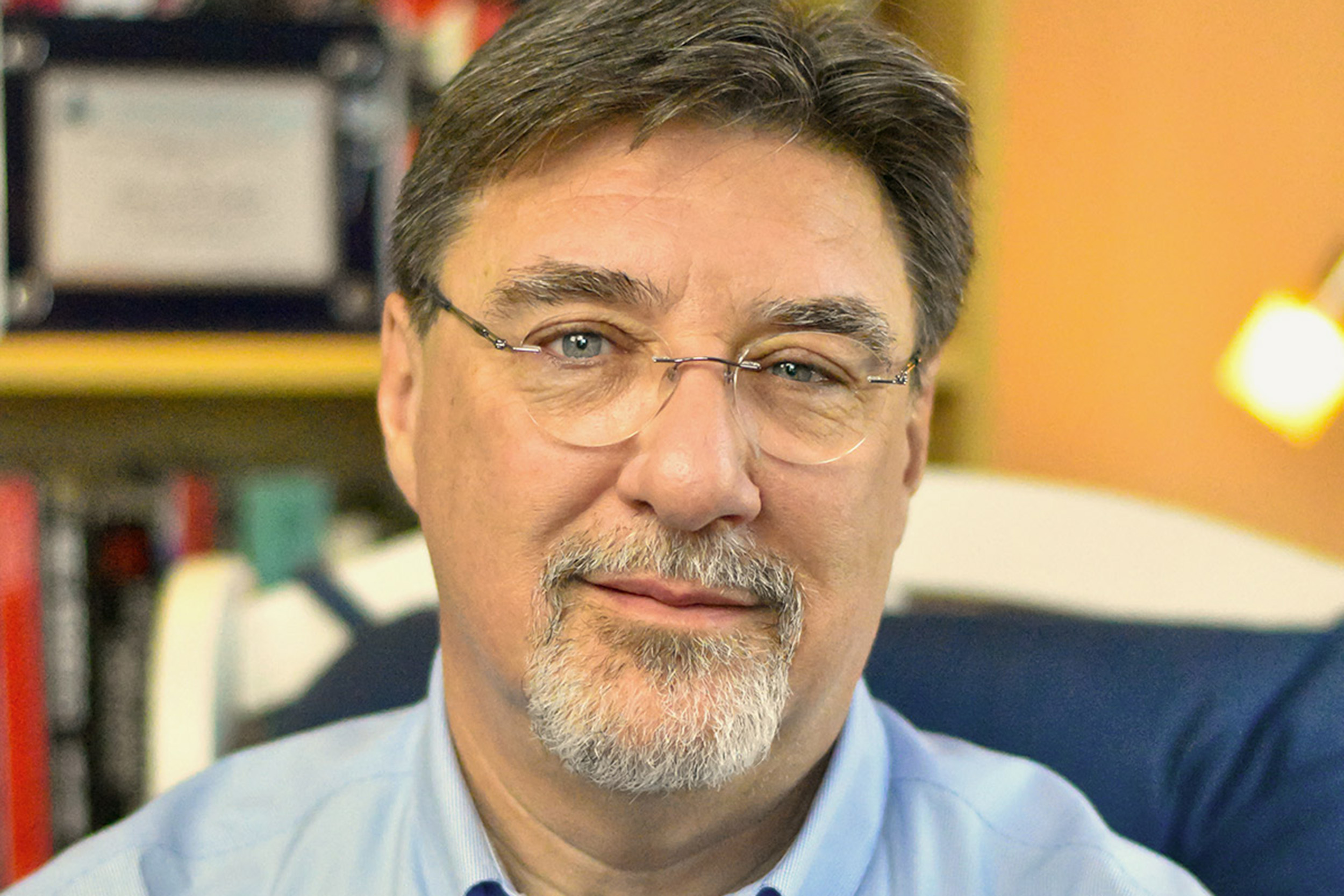
GAZETTE: What was it like behind the scenes?
NICHOLS: The show had scripted lines and a narrative. My lines didn’t make it into the show, as is often the case, but I had to read pages from a teleprompter, and some of the things I was reading are kind of uncomfortable because my character is a very right-wing guy. It was clear that they were setting up suspicion about the election in a way that I would never do. Even though I’m a right-leaning independent, that was a lot further than my politics would be.
In a way, it was too easy to play this role. It is very easy to get carried away. In the case of the character I was playing, it’s the complete disregard for facts. This is where I saw the parallel with things that happen at places like Fox and other conservative networks. If you don’t care about facts, and you’re not really trying to inform the public, it’s easy to talk about conspiracies, to cast doubt on elections, and to come up with crazy theories. It’s easy to just make stuff up. It is also easy for some people on television to go from being analysts to being actors, just giving the audience what they want, which is a very dangerous thing. In a democracy, if you’re on television and you’re reporting the news, you should be telling the truth to the public even if they don’t like it. In one of my last columns, I wrote to my readers, “What I write is truthfully my opinion, but I won’t lie to you.”
GAZETTE: What lessons can the show teach us about pundits and the dangers of blindly believing in them?
NICHOLS: People need to be clear when they’re watching the news on who they’re watching. There are experts who are there to give the background on an issue because of their own expertise. There are reporters who are there to just report the facts. And then there are pundits who bring their opinion to the table. I don’t think there’s anything wrong with that. As long as you’re clear which one you’re watching, and as long as those pundits use arguments in good faith. What I think the show should remind people about is how easily some pundits can fall into just acting. The Dominion lawsuit showed us that a lot of the pundits on Fox didn’t believe a word they were saying, and that’s very dangerous. To go on and say, “I know, this is not true, but I don’t care; it’s what the audience wants so I’m just going to do it” endangers our democracy. When I was acting that role, I realized that you could fall into that kind of persona because there are no consequences.
GAZETTE: In your view, how much did the show imitate life?
NICHOLS: I think the showrunners were psychic. A lot of the Dominion materials weren’t out yet. When the show aired, people were stunned at how much this looked like what was really happening. The episode is almost like a dark parable about what would have happened if Fox had caved into pressure on calling the election for Donald Trump. Because what happens in the show is that they have a unique circumstance that opens the door for them to call the election for the Republican candidate that one of the characters calls “Mr. Scary.” With what has happened over the past five months, the show became very timely.
GAZETTE: How do you think the show is going to be remembered?
NICHOLS: I think the real innovation in “Succession” is the dark humor. It’s really a very dark satire. And that began on television with shows like “The Sopranos” or “Breaking Bad.” I was a fan of those shows, but “Succession” takes it to another level. Even at this point, some of the things in the script still shock me; how just brutally raw they are. That, the intricate plotting, and the performances, but the laugh-out-loud-funny kind of humor is unique with “Succession.”
I also think the show is a good reminder of how much money can corrupt even family relationships. It makes us all ask the question that if billions of dollars were at stake, would we still love our brother and sister?
GAZETTE: What was your reaction when you saw yourself in last Sunday’s episode? What were your friends’ reactions?
NICHOLS: It was surreal. I saw myself but I couldn’t believe that was me behind Greg and Tom or on a monitor behind Shiv and Roman. I just couldn’t internalize that. I still can’t.
My friends have been very nice to me, but they’ve asked me, jokingly, where I’m going to get on television next. If it were up to me, the show I would love to be on is “Strange New Worlds,” the new “Star Trek” series. I’m too old to play an action hero. I’d probably have to be an old admiral, or an alien.



